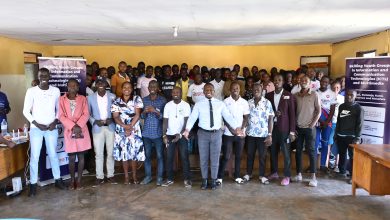Platform Economy Growth in Uganda: Tackling Gender Gaps and Improving Conditions for Young Workers

Platform Economy Growth in Uganda: Tackling Gender Gaps and Improving Conditions for Young Workers
The International Labour Organization (ILO), in partnership with the Ministry of Gender, Labour and Social Development, has released an important report highlighting the challenges and opportunities in Uganda’s Platform Economy. Titled “Platform Work in Uganda: Promoting Decent Work for All,” the study, conducted in collaboration with Makerere University, surveyed 647 platform workers across sectors including taxi services, delivery, online freelancing, and e-commerce to understand the landscape of digital labour platforms in Uganda. The report identifies key opportunities, challenges, and gaps in current policies.
During the report launch on Wednesday, November 20, 2024, at the Four Points by Sheraton Hotel in Kampala, Raymond Wasukira, Senior Labour Officer, who represented the Permanent Secretary of the the Ministry of Gender, Labour and Social Development (MGLSD) stated that “the findings of this report will guide us in addressing the gaps in Uganda’s platform economy to ensure that workers benefit from decent and equitable opportunities.” He added that collaboration between government, platforms, and stakeholders is key to achieving this goal.
Evans Lwanga, the Chief Technical Adviser for ILO PROSPECTS Uganda, echoed similar sentiments. “This report highlights the need for urgent policy interventions to ensure platform workers in Uganda are not left behind in the digital economy,” he said.
Key Findings
The report highlights that digital labour platforms have seen consistent growth since 2015, with 18 local and international platforms currently in operation. Although location-based services such as Uber, Bolt, SafeBoda, and Jumia are gaining popularity, the report indicates limited adoption of online freelance platforms due to the digital divide.
The report further reveals that that platform workers are predominantly young (ages 28-32) and well-educated, even in traditionally low-skilled sectors. While freelancers earn higher hourly wages compared to conventional workers, significant income insecurity remains, the report notes.
Additionally, earnings among platform workers vary considerably by sector and gender, with women earning less than men. A significant gender gap exists within freelance work, with men earning an average of 16,472 shillings (US$4.4) per hour for total work compared with 11,075 shillings (US$3) for women. Women earn almost 35% less than men, and this could partly be due to the occupational segregation of tasks as women are disproportionately concentrated in lower-paying fields like writing and administrative support, while men dominate in tasks such as IT and data analysis.
The report notes that while the majority of men (86%) believed that they received fair compensation for their online work, only 57% of women reported the same. This aligns with the findings that men tend to earn more, underscoring a significant pay gap between genders.
Long working hours are alarmingly prevalent, with taxi drivers and delivery workers working an average of 75–79 hours per week. The demanding and often unpredictable nature of platform work takes a toll on workers’ well-being, as they are often stressed. According to the report, freelancers work an average of 46 hours per week, with women working slightly more (50 hours) than men (45 hours). However, a significant portion of this time (10 hours) is unpaid, dedicated to activities like searching for tasks (67%), researching clients (38%), unpaid self-study (38%), client communication (29%) and profile-building (24%).
The survey findings reveal that the majority of workers transitioned to platform work from other jobs. This is primarily due to a lack of available jobs or a desire for better income and skill development opportunities. This transition from previous jobs is evident in the taxi (81%), and delivery (77%), with a smaller but still significant proportion in online freelancing (43%). While one-third of these workers in the taxi and delivery sectors previously worked in related fields, the remainder transitioned from different sectors. Freelancers typically came from salaried positions in various fields. About 58% of the sellers transitioned to the e-commerce marketplace and social media platforms from other jobs and one-third of them worked in related fields.
The challenges outlined in the report include, a lack of social protection for many workers, such as health insurance and pensions, and the prevalence of algorithmic management practices, which restricts workers autonomy and increases stress. Common issues also include account deactivations and unpaid tasks that has an impact on their earnings and livelihoods.
Despite the informal support available through social media, there is minimal organised advocacy for worker rights, indicating a need for greater collective action and unionization.
Recommendations
To ensure decent work conditions for platform workers, the report recommends several policy reforms. Establishing clear legal frameworks to classify workers and define employer responsibilities, guaranteeing the right to organize and engage in collective bargaining, and introducing tailored social security mechanisms for platform work. Addressing occupational safety and health (OSH) risks specific to platforms and enhancing data protection and ensuring transparency in algorithmic processes are the other key recommendations.
As Uganda’s digital economy continues to grow, this report accentuates the urgency of implementing fair and inclusive policies. These findings are timely as the ILO gears up for deliberations on promoting decent work within the platform economy during the upcoming 2025 and 2026 International Labor Conferences.
About the ILO
The International Labour Organization is a UN agency uniting governments, employers, and workers from 187 member states to promote decent work globally.
The ILO in Uganda is actively implementing initiatives to harness the potential of the digital economy in creating job opportunities for youth. These efforts focus on developing digital skills and facilitating job matching within the gig economy, including in refugee settlements. Other key activities include awareness-raising training on labour laws in collaboration with Uganda’s workers union apex body, National Organization of Trade Unions (NOTU) and the launch of a new Community of Practice initiative led by the Federation of Uganda Employers, aimed at fostering collaboration and compliance with decent work principles in the digital economy.





